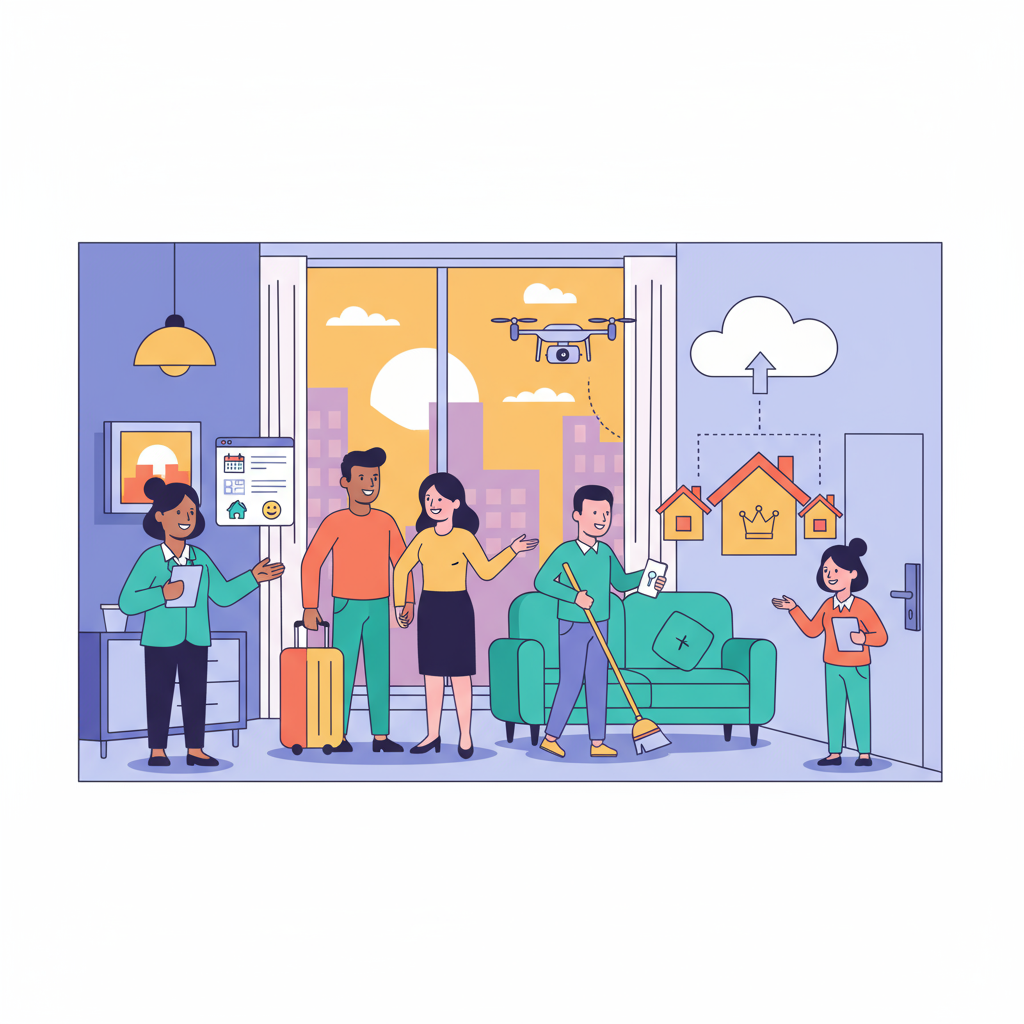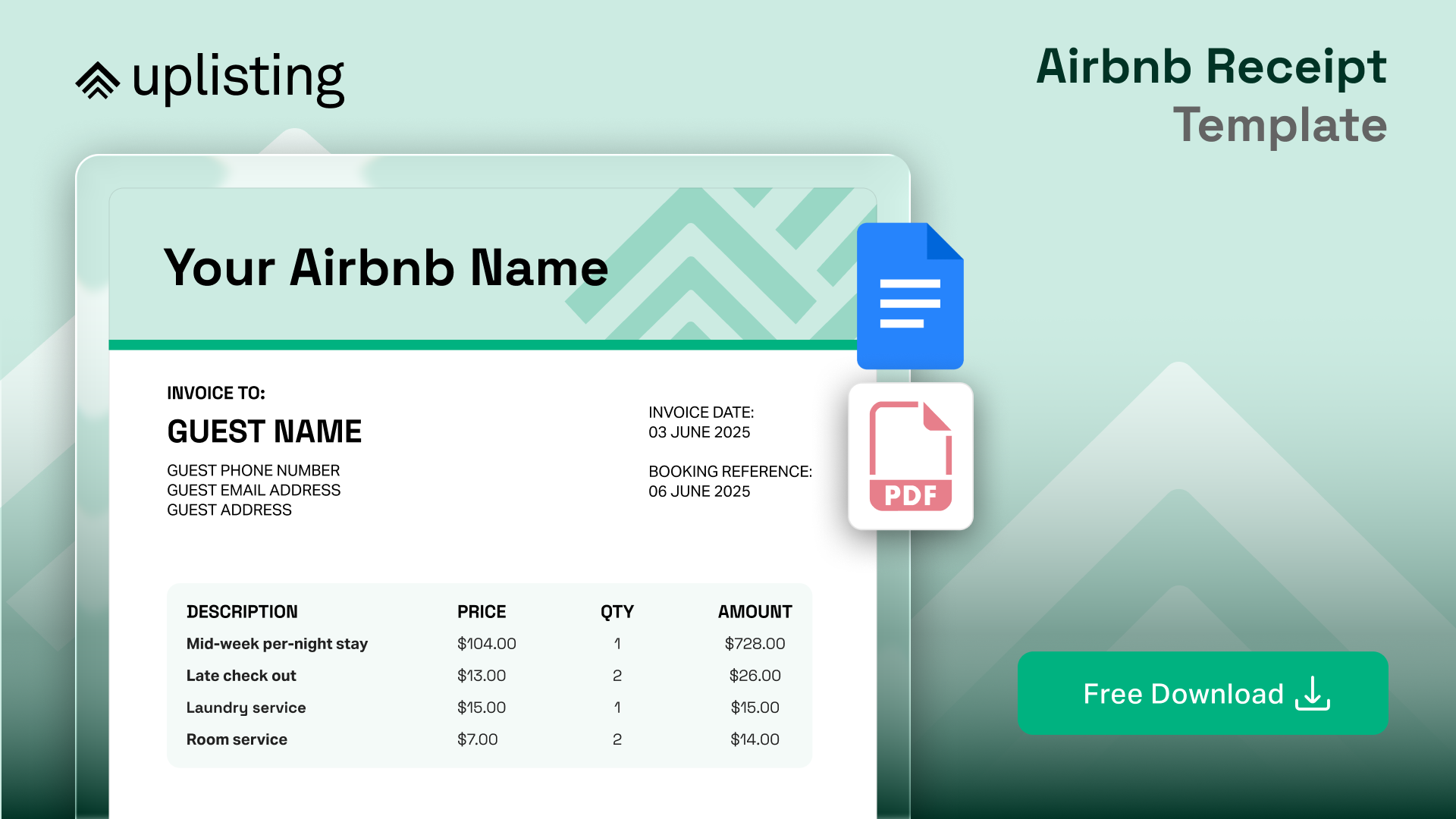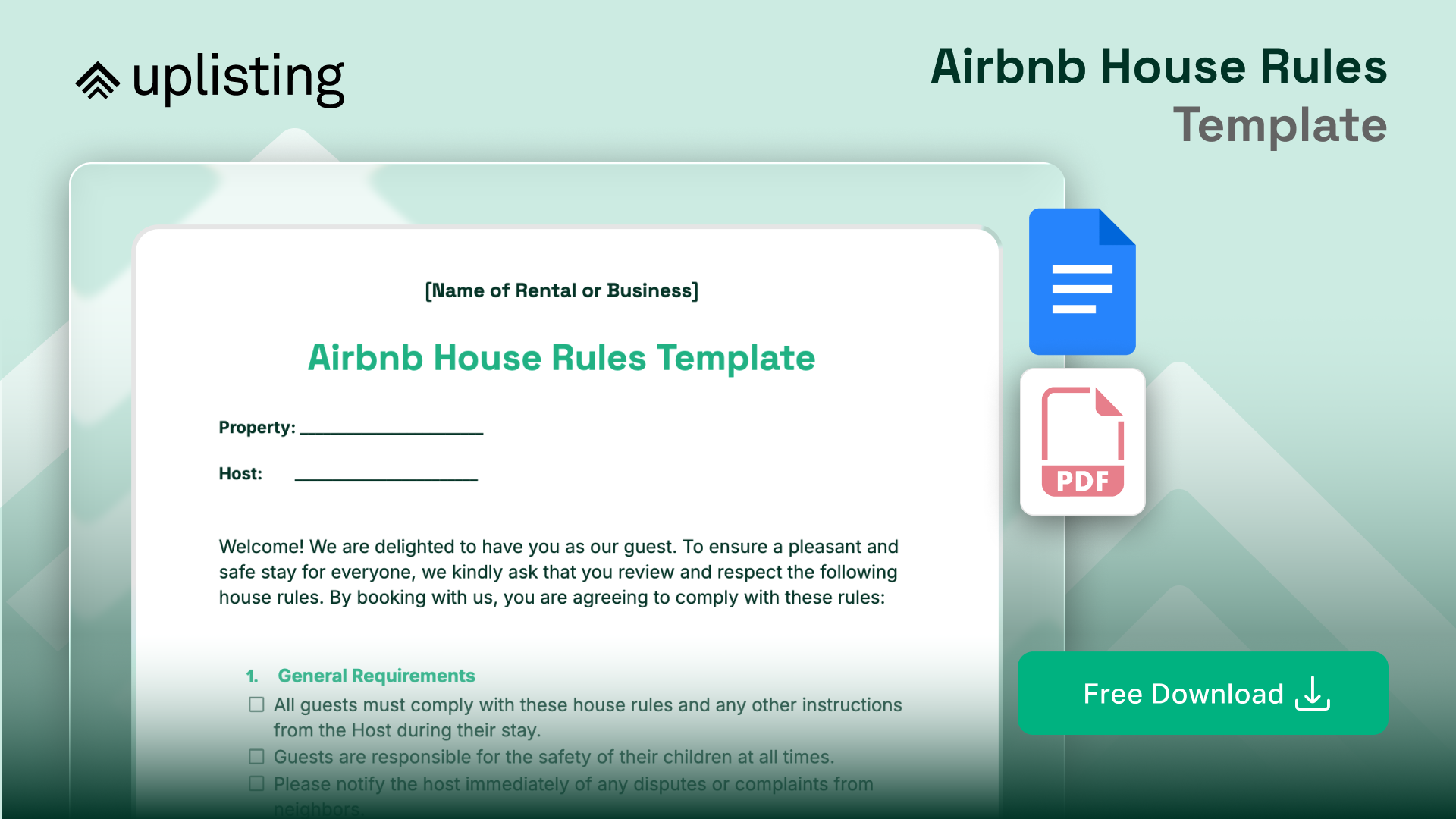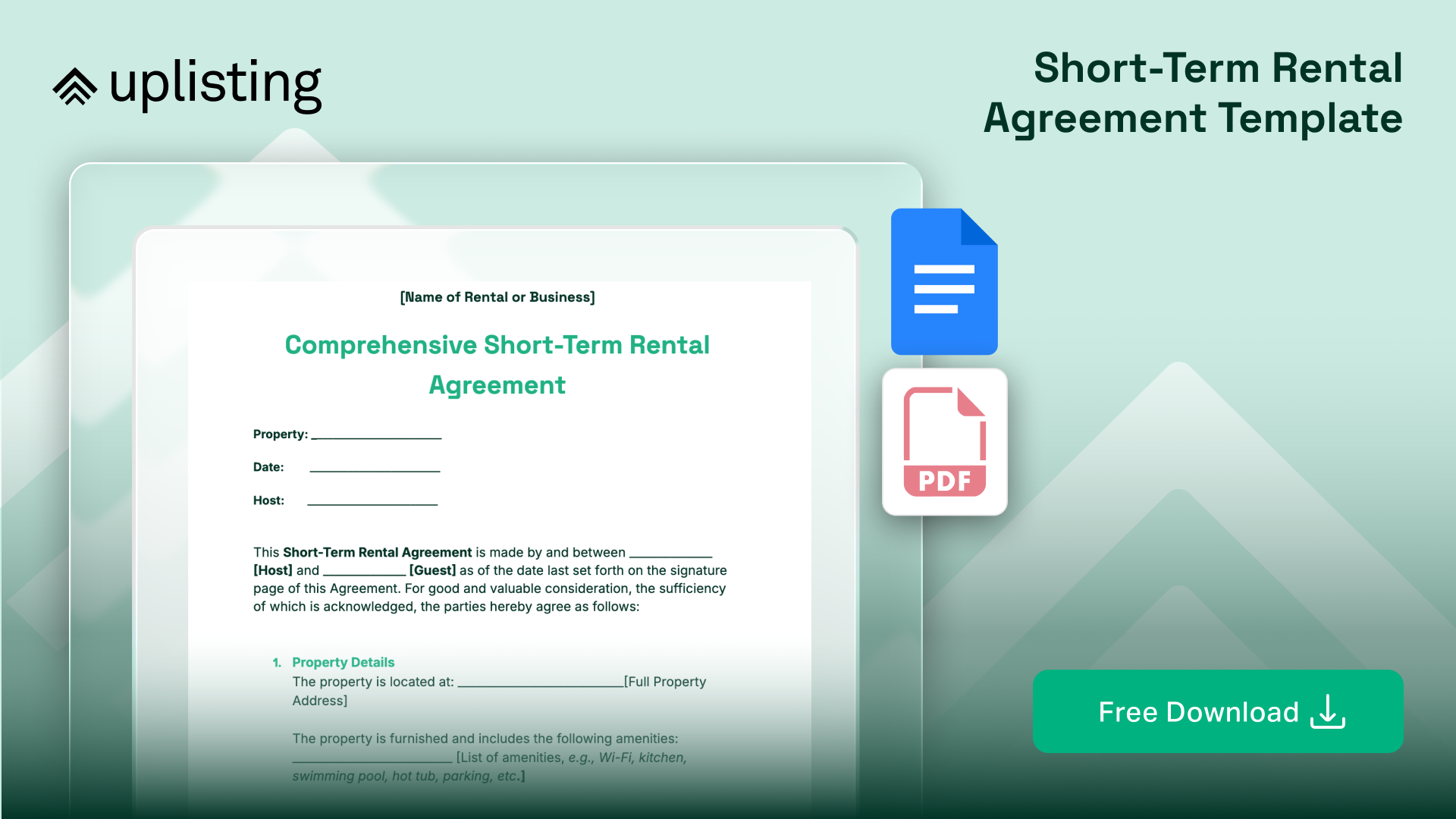Key Takeaways
2026 is set to be a transformative year for short-term rentals, with new booking trends and guest expectations shaping how hosts market their properties
Success now depends on automation, brand consistency, and mastering multiple channels, not just Airbnb
A data-led marketing strategy helps hosts stay visible, build loyalty, and maximize occupancy year-round
Tools like Uplisting make it easier than ever to streamline marketing, distribution, and guest communication from one platform
If you’ve been hosting for a while, you’ve probably noticed something: the playbook that worked two years ago doesn’t quite cut it anymore. The days of relying on Airbnb’s algorithm, static pricing, and a few nice photos are gone.
In 2026, vacation rental marketing is evolving faster than ever. Guest expectations are higher. Competition is sharper. And the platforms that once made hosting simple are now crowded with full-time hosts using professional tools and data-driven strategies.
But that’s exactly why opportunity still exists for hosts who learn to think differently. The most successful property managers in 2026 aren’t the ones with the biggest budgets; they’re the ones who know how to use technology, storytelling, and automation to scale smarter, not harder.
This guide is here to help you do just that. We’ll walk through every major piece of the modern vacation rental marketing puzzle, from search visibility and brand building to guest experience and automation, and show you how tools like Uplisting bring it all together behind the scenes.
Why Marketing Matters More Than Ever in 2026
Not long ago, simply being on Airbnb was enough to stay booked.
Your photos looked good, your reviews were solid, and guests would find you without much effort. But in 2026, the short-term rental industry is changing. The vacation rental market has matured, and that means visibility, trust, and brand recognition now matter just as much as the property itself.
Competition is up, and algorithms are changing.
More hosts than ever are treating short-term rentals like full-fledged businesses. They’re investing in professional photography, automated guest journeys, and advanced pricing tools. At the same time, platforms like Airbnb and Vrbo are tweaking search algorithms to reward consistency, response speed, and guest satisfaction, not just availability. If you’re not actively managing your marketing, you’re quietly falling behind.
Guests are more selective than ever.
Modern travellers don’t want generic stays. They want experiences that feel personal, trustworthy, and effortless from start to finish. That means hosts who show personality through branding, content, and communication stand out in a crowded field. Your listing isn’t just a place to sleep — it’s your storefront, and marketing is how you keep people walking through the door.
Technology is closing the gap.
What used to require a full-time marketing manager can now be handled with automation. Smart hosts use platforms like Uplisting to streamline pricing, reviews, and guest communication — freeing up time to focus on storytelling, social media, and partnerships. When your systems run themselves, your brand has room to grow.
The takeaway? Marketing is no longer optional. It’s the foundation that separates thriving hosts from fading listings. Whether you manage one property or twenty, the hosts who master their marketing in 2026 won’t just keep up — they’ll lead the market.
The short-term rental industry has entered a new era of competition. More properties crowd the major listing platforms, and the days of standing out with minimal effort have passed. Guests now expect a hotel-quality experience—fast communication, professional presentation, and reliable service at every step. As the bar rises, hosts who approach their business with a professional mindset are the ones who see consistent bookings and higher revenue.
Relying on a single channel like Airbnb no longer cuts it. Travelers discover rentals through a mix of Google searches, Instagram posts, word of mouth, and direct booking websites. With guest attention divided across these platforms, hosts must meet them where they are—not just where it’s convenient. This shift means every host needs a holistic marketing strategy that covers all touchpoints: boosting visibility across channels, building a memorable brand, and nurturing guest relationships for repeat stays. The right approach keeps your properties top of mind and sets the stage for sustainable success in 2026.
Save yourself from your inbox
Automate with Uplisting
Automated guest messages keep your guest informed from booking through to check-out. They’re designed to answer questions before they arise, saving you time whilst keeping your guests happy.
Expert Hosts are Building a Standout Brand
Branding in 2026 goes way beyond a fancy logo or a catchy tagline.
For small and mid-sized hosts, a standout brand means guests instantly recognize, trust, and remember your properties. In a sea of nearly identical listings, a strong brand becomes your shortcut to more bookings and higher guest satisfaction.
Consistency builds trust.
Use the same tone of voice, style, and imagery everywhere guests interact with your business, whether it’s your direct booking site, Instagram, or even your text messages. Keep your listing descriptions, replies, and welcome notes sounding like they came from one person who cares about the details. Skip the logo on every pillow, but stick to a signature greeting, a clear writing style, and visuals that feel unmistakably yours.
Photos matter more than ever.
Professional photography brings your property to life and instantly signals credibility. Well-lit, thoughtfully staged images catch the eye and start telling your story before guests read a single word. Pair those visuals with descriptions that highlight real experiences, like morning sunlight on the patio or local art in the hallway, so guests picture themselves there before they book.
Every guest interaction shapes your brand.
Offer digital guidebooks, automated emails, and friendly check-in messages that sound like you, not a robot. Automation lets you send personalized, brand-consistent updates every time, whether you manage one property or five. Guidebooks in your voice, confirmation messages that feel personal, and follow-ups that welcome guests back all work together to build your reputation. The vacation rental marketing guidebook for 2026 makes it clear: guests remember how hosts treat them, not just a list of amenities.
Channel Strategy: Thinking Beyond Airbnb
While Airbnb has been dominating the market, in 2026, hosts who rely only on Airbnb leave money on the table and put their businesses at risk.
In 2026, experienced hosts list properties across multiple channels: Airbnb, Vrbo, Booking.com, and Expedia pull in distinct guest types, while direct booking websites help build stronger guest relationships and cut out extra fees. Focusing on just one site limits your reach and hands too much control to a single company’s changing rules.
Expanding to multiple channels grows your audience, fills calendar gaps, and protects your operation if a platform changes policies overnight. Vrbo tends to attract families looking for longer stays, Booking.com often appeals to city travelers, and Expedia brings in business guests. A direct booking site puts you in control, lets you build a recognizable brand, and helps keep more revenue in your pocket. Managing several calendars and guest inquiries by hand, though, quickly turns into a nightmare.
Concerned about how much time this is about to take out of your 2026 schedule? Don't be. Channel managers are there to take care of the heavy lifting.
These platforms sync pricing, availability, and booking rules instantly across every site, preventing double bookings and cutting out repetitive admin work. You connect your properties once, set your rules, and let the system update everything automatically. No more late-night scramble to fix calendar mistakes or deal with double-booked weekends. Learn more about how a channel manager can help vacation rental hosts here.
To see which channels deserve your attention, start tracking booking sources and profits. Some platforms fill dates but eat away at margins with high fees or attract guests who cause headaches. A direct booking site often brings in longer stays and repeat guests for less effort. Data from your channel manager can show where your best bookings come from.
Our vacation rental marketing guidebook for 2026 is all about a simple rule: spread your listings, automate your updates, and let your channels serve your business goals.
Enjoy the confidence & focus you need to scale your vacation rental business
Book more while doing less
With a reliable VRM solution you can trust, Uplisting can help you grow your business without wasting time on double bookings, unhappy guests, upset clients and worrying what could go wrong next.
SEO and Content Marketing Remain Important
Ranking well on search engines means guests find your direct booking website right when they want to travel.
Without solid SEO, your site fades into the background, buried beneath booking platforms and hotel chains. A strong ranking puts your property in front of travelers who are searching for a place to stay in your town, not just hoping to stumble across your listing.
Content marketing keeps your brand front and center for guests at every stage of their trip planning. Blog articles, local area guides, and FAQs answer the questions real travelers ask before they book. For example, a blog post titled “Top things to do near Lake Placid” or “Best restaurants in Flagstaff” helps you show up on Google when guests look for activities or dining options. Local guides also position you as the host who really knows the area, building trust before a guest even checks your availability.
FAQs deserve your attention too. Guests search for answers about pet policies, check-in times, parking, and Wi-Fi speed, often before comparing prices. When you publish clear, direct answers, your site looks more useful to both guests and search engines. Refresh FAQ content often, since guest concerns change with seasons and trends.
The good news is that producing high-quality content no longer means spending hours hunched over a keyboard.
Smart content tools now draft blog outlines, suggest keywords, and create first drafts for local guides in just minutes. Automated platforms schedule posts, polish headlines, and track which topics bring the most visitors. You still add your own perspective and stories from your neighborhood, but smart automation handles the heavy lifting, letting you focus on running your business, not just your website.
Our vacation rental marketing guidebook for 2026 makes it clear: when you blend automation with your own voice, you get better content and more direct bookings.

Social Media and Email Marketing Looks to Grow
Social media and email might sound like old tools in a new market, but in 2026, they’re more important than ever.
The difference is how hosts are using them. Instead of random posts or generic newsletters, top hosts are turning these channels into real brand assets that attract guests long before they ever open Airbnb.
Social media: Your always-on shopfront
Social media has evolved from a “nice-to-have” into a discovery engine. Travelers no longer rely solely on Airbnb’s search bar, they find stays through TikTok reels, Instagram travel content, and influencer recommendations. The most successful hosts understand that visibility now begins long before the booking page.
Here’s what works in 2026:
Authenticity beats perfection. Guests want behind-the-scenes snippets, from morning light in your property’s kitchen to quick videos explaining local tips.
Short-form video dominates. TikTok, Instagram Reels, and YouTube Shorts drive organic reach and viral discovery, especially when your property is tagged in location-based hashtags.
Micro-influencers matter. Partnering with local travel creators builds trust and puts your listing in front of a pre-qualified audience of potential guests.
AI-driven scheduling tools allow you to post consistently without burning hours each week. Many hosts now create a month of content in one sitting.
Your goal isn’t to “go viral.” It’s to be visible, so that when guests start searching for a place in your area, they already recognize your brand.
Email marketing: your secret to repeat bookings
While social media brings guests in, email keeps them coming back. Repeat guests are gold in 2026: they’re cheaper to convert, easier to manage, and more likely to leave detailed, loyal reviews.
Smart hosts are using email to:
Automate stay follow-ups. Thank guests, request reviews, and offer a discount for direct rebooking next time.
Share local guides and seasonal updates. Keep your name top of mind even when they’re not traveling.
Announce new properties or upgrades. Email is the most reliable way to convert past guests into future customers.
Integrate with your PMS (like Uplisting) to pull guest data automatically so there's no manual list management required.
And because privacy laws and inbox competition are tightening, personalization has become key. Emails that reference a guest’s previous stay, local preferences, or travel dates get opened. Templates that look like mass marketing don’t.
When done right, your social and email strategy forms a powerful cycle: social brings in new guests, your listing converts them, and email keeps them coming back.
All-in-one Vacation Rental Software and Channel Management System
Get started in seconds by connecting Airbnb
Manage short-term rentals & bookings, message guests, take payment, and so much more. All in one easy-to-use platform (that never double-books).
Dynamic Pricing and Data-Led Decisions
Pricing strategy decides who wins in 2026. Setting one nightly rate and hoping for the best doesn’t cut it when guests compare dozens of options across five platforms. Charge too little, and you lose revenue. Charge too much, and your calendar stays empty. Pricing automation steps in, keeping you competitive and profitable without endless tweaking.
Modern hosts lean on dynamic pricing engines that track real-time demand signals. These tools scan local calendars, monitor competitor rates, spot citywide events, and even react to school breaks or sudden weather changes. Rates shift automatically, always keeping your properties in the sweet spot—high enough to protect earnings, low enough to stay booked. If you want higher minimums on weekends or a discount to fill last-minute gaps, you set the rules and automation handles the busywork.
Manual tweaks can’t keep up with the constant shifts. A headline concert, a spike in local reservations, or a sudden dip in demand can all blindside you. Data-driven pricing software spots these changes in real time and updates your listings before you even notice. Less time spent on spreadsheets means more time spent on guest experience.
Direct integration with leading pricing engines makes the process even smoother. Your calendar, occupancy, and minimum stays sync instantly, so your rates always reflect the latest demand and competition. When a neighboring property slashes its price or a festival draws a surge of guests, your listings respond automatically—no late-night panic, no lost revenue. For a closer look at how integration streamlines your workflow, read more here.
The vacation rental marketing guidebook for 2026 points to one advantage: hosts who put data-led pricing on autopilot stay ahead of the market. The right setup keeps your rates sharp, your calendar full, and your business moving at the speed of demand.
Reputation and Review Management
Strong pricing strategies bring guests in... but your reputation keeps them coming back.
Reputation works like currency for short-term rentals. High review scores on every platform lead to more clicks, more bookings, and more trust. Guests size up your property in seconds. Consistent five-star ratings and thoughtful responses show care for guest experience before any booking happens. In a crowded field, spotless reviews do the selling.
Delivering on promises, fixing problems fast, and leaving guests with memorable details are the foundation for positive reviews. A local snack on the table or a handwritten welcome note can stick in a guest’s mind far longer than any generic gift basket. Right after checkout, send a short, friendly message to thank guests and invite feedback. Personalization works best. Mention a detail from their stay, so the review request stands out as genuine rather than robotic.
Negative reviews will appear, but they don’t have to sink your reputation. Quick, calm, and professional replies show you’re paying attention. Own any mistake, offer a solution, and keep the conversation civil, because your future guests are always watching. A clear apology, a brief explanation, and a promise to improve show you take every review seriously.
Automation can handle review requests so you never miss a guest. Set up post-checkout messages that thank guests by name and reference their actual stay. This keeps outreach consistent and friendly, no matter how many properties you’re juggling.
You’re in great company
Sign up
Some of the largest short-term rental operators (with 250+ properties) rely on Uplisting's software to scale their businesses.
Automation: The Secret to Scaling in 2026
Running multiple Airbnb listings once meant living in constant motion, replying to late-night messages, chasing cleaners, and double-checking calendars. But in 2026, the most successful hosts aren’t doing more; they’re automating smarter.
Automation has become the quiet superpower behind every scalable vacation rental business. What used to take whole weekends now happens automatically.
Automation that feels human
With the right setup, hosts send perfectly timed messages that make every guest feel looked after. Pre-arrival notes share parking info, door codes, and local tips before check-in. Cleaning teams see their next job the moment a booking is confirmed, keeping turnovers seamless and schedules perfectly aligned.
Dynamic pricing tools adjust rates in real time, reacting to local events, demand shifts, or cancellations. When a booking comes in, calendars sync instantly across every channel, blocking dates everywhere and alerting cleaners to upcoming checkouts. If a guest cancels, availability reopens automatically.
Scaling without the stress
With one dashboard managing every booking, message, and payment, hosts spend less time chasing tasks and more time improving the guest experience.
The result? A business that grows without chaos. Smart systems turn a handful of listings into a smooth-running operation that feels professional from every angle.
In 2026, hosts who embrace automation set the pace. While others juggle, they scale confidently, deliver better guest experiences, and enjoy something that’s become increasingly rare in hospitality: time.
The Future of Vacation Rental Marketing
The next era of vacation rental marketing isn’t just about new platforms and getting better at the same old tricks.
Artificial intelligence now powers every stage of the guest journey, learning from booking behavior, stay preferences, and review patterns to predict what guests want before they ask. From tailored upsells to personalized local recommendations, technology is turning hospitality into something truly anticipatory.
Staying ahead in 2026 means adapting fast. The best hosts don’t wait for change, they test new tools, refresh their messaging, and use data as a compass rather than an afterthought. Every guest touchpoint is an opportunity to build loyalty, elevate reputation, and grow sustainably.
Vacation rental marketing has evolved far beyond “list it and they will come.” Today’s most successful property managers operate like brands, blending multi-channel visibility, automated systems, and a deep understanding of guest psychology. The competition is sharper than ever, and travelers expect a frictionless, hotel-quality experience from the moment they find you to the second they check out.
This guidebook has walked through the strategies that will define success in 2026, from mastering direct bookings and building memorable brands to using automation and data to scale confidently. The message is simple: hosts who combine creativity with intelligent marketing systems will own the future of short-term rentals.
Ready to market smarter, not harder? Sign up for Uplisting to streamline your vacation rental management.
So automatic, you won’t know what to do with yourself
Put my rentals on autopilot
It’s simple to automate repetitive tasks with Uplisting's short-term rental software. You’ll save hours every week and eliminate human error. Go ahead — take some time off.
FAQs About Vacation Rental Marketing
Why should I focus on direct booking strategies?
Direct booking strategies send more revenue your way by skipping OTA fees and letting you stay connected with every guest.
When guests book directly, you control every touchpoint, from the first inquiry to the post-stay follow-up, which means you can deliver a more personal experience and invite those same guests back again and again.
Building a direct booking channel also gives you full control over cancellation rules, guest communications, and special offers, so your brand (not a platform) sets the tone for every stay.
What does an automated marketing tool do?
Automated marketing tools handle repetitive jobs like sending guest messages, scheduling cleanings, and tracking booking data so you can focus on growth and guest experience.
These systems keep communication quick and accurate, slash manual mistakes, and show you which marketing channels actually bring in bookings, all without constant oversight.
With less time spent on admin, you get more hours back for the details that set your business apart.
How do dynamic pricing solutions help me earn more?
Dynamic pricing solutions constantly adjust nightly rates to match real-time demand, season, and local events, so your listing always stays competitive.
These tools respond right away to changes in guest searches, competitor rates, or citywide festivals, helping you fill calendar gaps and charge top dollar when demand spikes. Every vacation rental marketing guidebook recommends data-driven pricing because it means your revenue tracks with the market, not just your gut feeling.
















.png)

